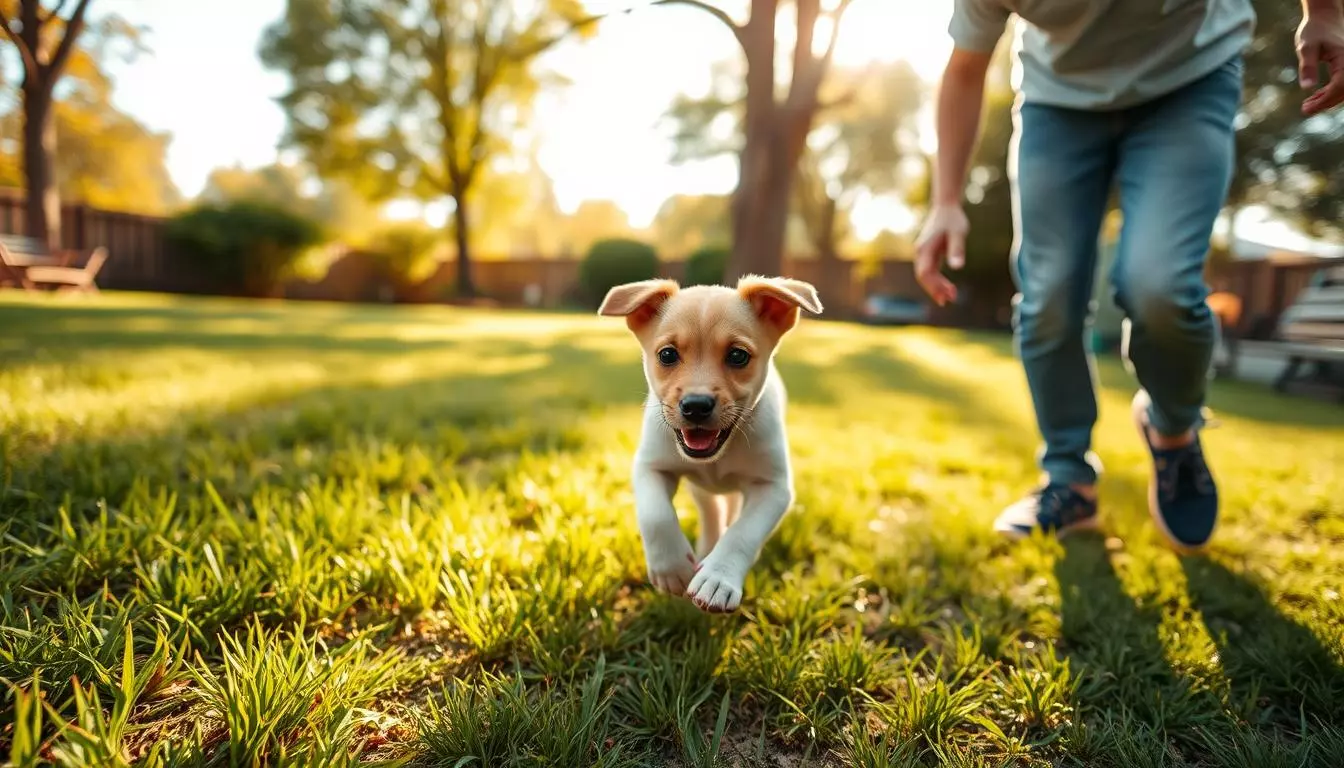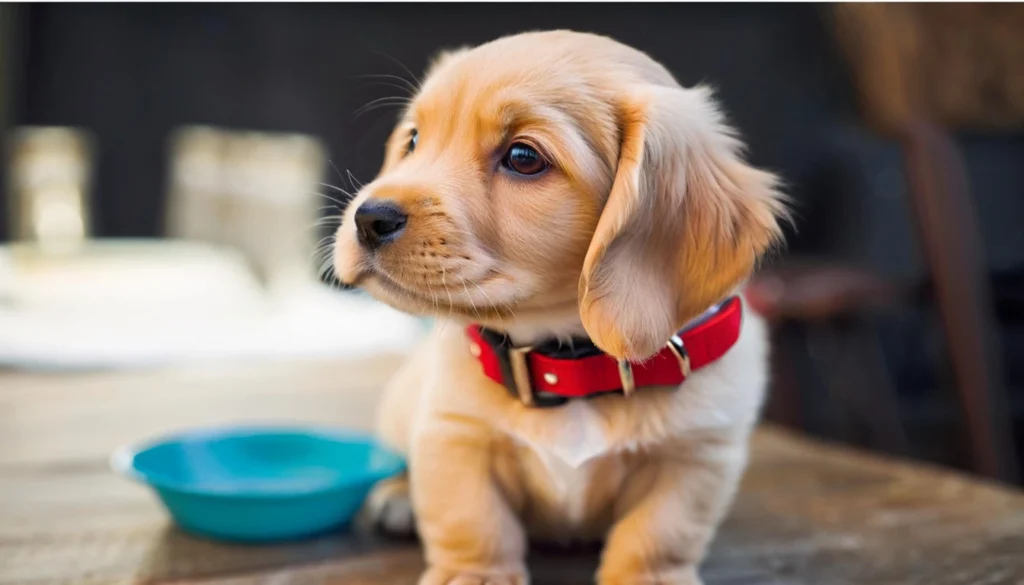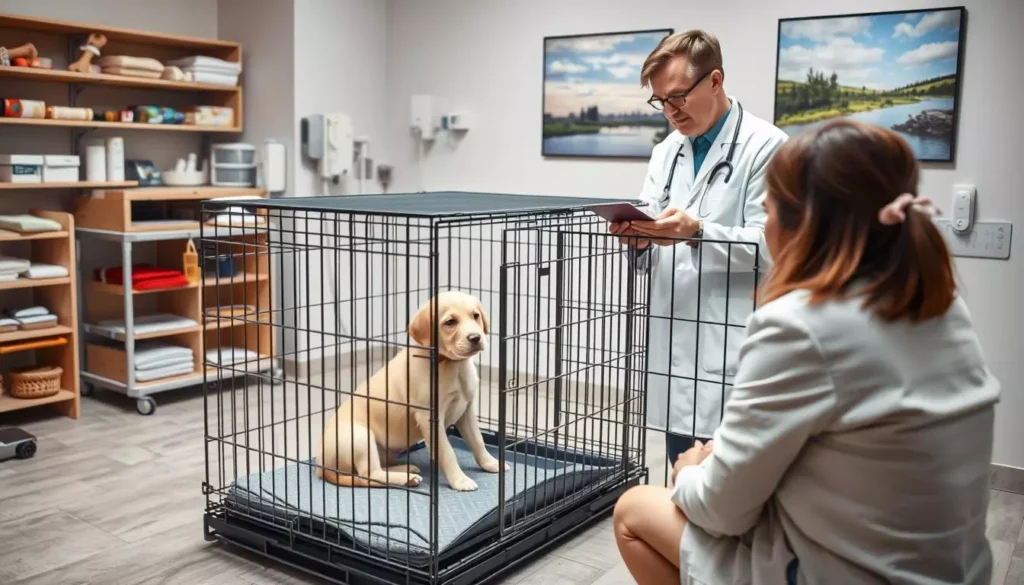Watching my puppy run off is heartbreaking. I often wonder, "why does my puppy run away from me?" It's not just a fun game of chase. There's usually a deeper reason behind it.
Maybe it's the smell of something interesting or a sudden noise that scares them. Knowing why my dog runs away when I approach is key to a stronger bond. Let's explore together the reasons behind this behavior, hoping to find answers for both of us.
We'll look into puppy behavior, instincts, and the anxiety that can happen during our time together. By understanding these, I aim to offer reassurance and strengthen your bond with your puppy.
Key Takeaways
- Understanding your puppy's instincts is key to preventing running away.
- Fear and anxiety can drive a puppy to flee, highlighting the need for a safe environment.
- Boredom can lead dogs to seek adventure elsewhere.
- Recognizing signs of stress in your puppy is essential for addressing underlying issues.
- Consistent training plays a vital role in fostering a strong bond between you and your puppy.
Understanding Puppy Behavior
To figure out why my puppy runs away, I need to understand puppy behavior. Puppies are naturally curious and love to explore. This curiosity makes them wander off to find new things.
When I watch my puppy, I see how excitement can make them run. They might chase a squirrel or follow a sound. Fear also plays a big role. Loud noises or new places can make them run away to feel safe.
Keeping my puppy engaged helps prevent them from running off. I give them fun activities that match their interests. This way, they use their energy in a good way. Knowing how puppies behave helps me connect with them better, especially when they wander too far.
Common Reasons Why Puppies Run Away
Puppies often want to run away for many reasons. These reasons come from their instincts and the world they see. Knowing these reasons helps us create a safe space for them. This way, they are less likely to wander too far.
Instincts and Natural Exploration
When a dog runs away, it's often because of natural curiosity. Puppies love to explore their surroundings. This curiosity can make them wander off, especially if they smell something interesting.
Breeds like Beagles and Huskies are more likely to do this. Their instinct to chase can make them ignore commands.
Fear and Anxiety Triggers
Fear and anxiety can also make puppies run away. Loud noises or new places can scare them. In these situations, they might flee to feel safe.
Boredom and Lack of Stimulation
Not having enough to do can also make puppies wander. If they're bored, they might look for excitement outside. This shows how important it is to keep them engaged and active.
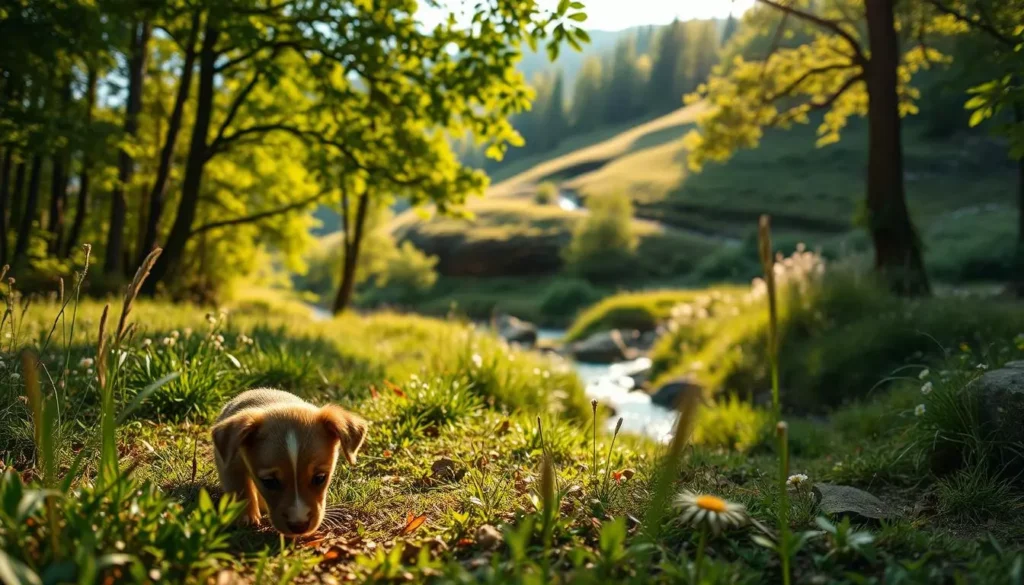
Fear, Anxiety, or Trauma
Understanding my dog's emotions is key to a strong bond. Fear, anxiety, or trauma can show in their behavior. Spotting stress early helps me ease their fears and improve their life.
Identifying Signs of Stress
It's important to know when my dog is stressed. Look out for:
- Trembling or shaking
- Excessive barking
- Avoidance behavior, like hiding or attempting to escape
- Destructive actions when left alone
- Changes in eating habits
These signs show how my dog feels. Being alert and taking action helps them feel safe.
Addressing Past Trauma
If my dog has faced trauma, I must be kind and patient. There are ways to help them heal, like:
- Establishing a predictable routine
- Using calming aids like pheromone diffusers or anxiety wraps
- Incorporating desensitization training for specific triggers
- Consulting a professional trainer or behaviorist if necessary
By understanding and addressing their anxiety, I can build trust. This helps my dog live a happier, more fulfilling life.
Environmental Factors
Many things in the environment can affect a puppy's behavior. Loud noises are a big stress for them. Knowing this helps me understand what my puppy goes through.
The Role of Loud Noises
Loud noises scare dogs a lot. Things like thunderstorms, fireworks, and construction sounds are common culprits. These sounds can make my puppy very anxious.
They might want to run away to find a safe spot. Knowing loud noises are a big problem helps me get ready for them. It's important to make my puppy feel safe when these noises happen.
Impact of Unsecured Spaces
Spaces that aren't secure can make a puppy anxious. If fences are too low or there are gaps, my puppy might try to escape. If my puppy feels unsafe, it might run away to find a safe place.
Keeping the environment secure is key. It helps prevent my puppy from running away and makes it feel safer.
Health and Cognitive Issues
Physical health and cognitive issues can greatly affect a puppy's behavior, especially when they run away. Different health problems might cause discomfort or confusion. This can make my puppy wander off from familiar places. I must watch for signs that might show this is happening.
Cognitive dysfunction in dogs is like dementia in humans. It can affect older dogs but also younger ones. It shows through changes in behavior, confusion, and getting lost. If my puppy forgets commands or seems lost in places they know, it's a warning sign.
It's also key to keep an eye on my puppy's physical health. Vision or hearing problems can make it hard for them to get around. Regular vet visits are crucial to catch and treat any health issues that might cause them to wander.
Understanding how my puppy's health affects their wandering can help me better care for them. By focusing on their overall health, I can lower the risk of them running away. This is due to confusion or health problems.
Reinforced Behavior: Why Dogs Learn to Run Away
Understanding why dogs run away is key. Positive reinforcement shapes their actions. When a puppy enjoys escaping, they want to do it again.
For instance, if my dog loves chasing a squirrel, they link running away with fun. This makes them want to explore more.
Positive Reinforcement and Adventures
Positive reinforcement helps dogs learn. Praise or treats for tricks or commands make them repeat. This also applies to running away.
If my dog finds fun while evading, they see it as a reward. This positive feeling makes them want to run away again.
Developing a Chase Response
Running away also triggers a chase instinct. The thrill of evading makes them chase more. This becomes a strong learned behavior.
It's important to know my reactions affect their choices. Whether I'm frustrated or excited, it matters.
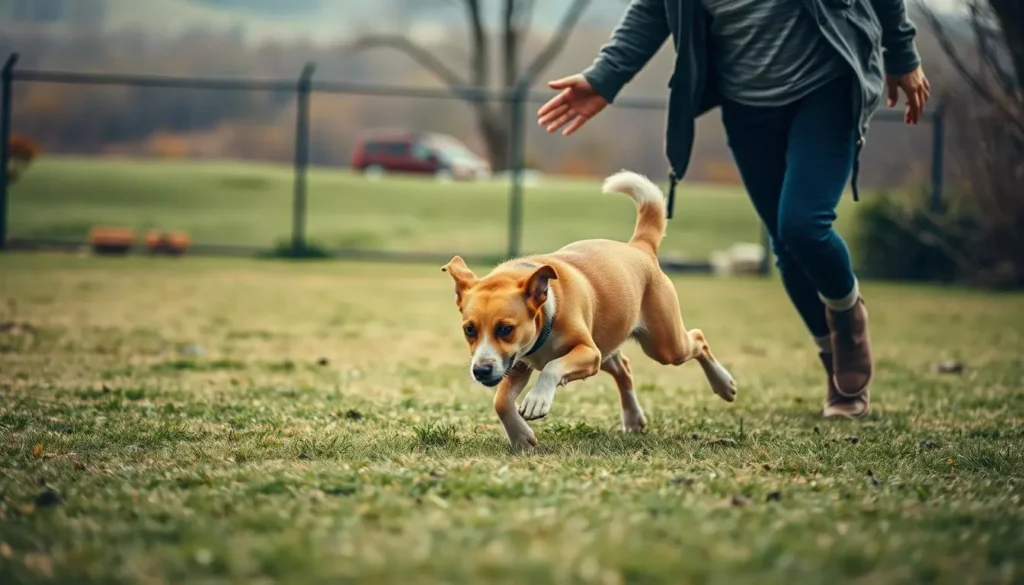
Why Does My Dog Run Away From Me When I Approach
When my dog runs away as I approach, it makes me wonder why. Fear might be the reason. Dogs often see human movement as a threat, making them want to stay away.
They might also want to be independent. My coming near could seem like a challenge to their freedom. It's important to understand why they do this.
Helping my dog overcome fear takes patience. Building trust takes time. Gentle interactions help create a safe space.
Positive reinforcement helps my dog feel more at ease. Respecting their space and watching their body language helps them feel more confident around me.
How to Prevent Your Puppy From Running Away
Preventing your puppy from running away starts with creating a safe space. This means making sure your yard is secure and your dog gets enough exercise. This way, you can make sure your puppy is happy and safe at home.
Secure Your Environment
Keeping your yard safe is crucial. Use strong fences and secure gates to block off areas. Always keep doors closed to keep your dog inside. Watch the gates during parties to stop them from opening.
Check your yard's fences often. This helps find any weak spots that need fixing.
Provide Adequate Exercise
Exercise is also key to keeping your puppy from running away. Take them for walks, play with them, and try dog sports. A tired puppy is less likely to wander off.
Having a daily routine keeps your puppy active and happy. It helps them stay in the yard and not look for adventures elsewhere.
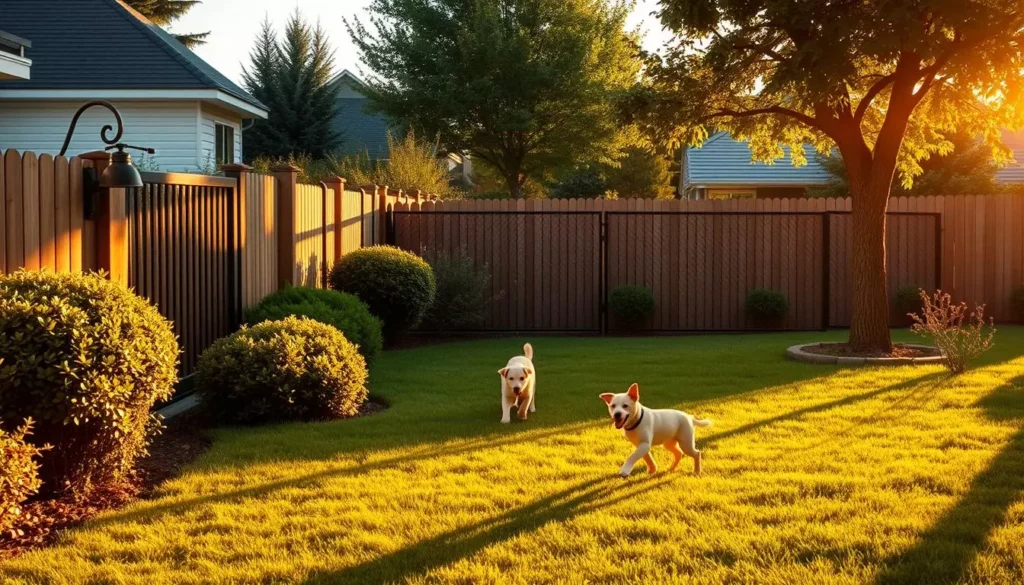
Enhancing Your Bond Through Training
Building a strong bond with my puppy starts with good training. Recall training is a key method to strengthen our connection. It helps my dog come back quickly when called, reducing the risk of them getting lost.
Here are some tips to improve your dog's recall skills:
Recall Training Techniques
Recall training needs a clear plan. Here are some methods to try:
- Choose a distinct command: Pick a unique word or phrase for your dog to come back.
- Use positive reinforcement: Treats or praise for successful recalls will make your dog want to do it again.
- Practice in different environments: Adding distractions helps your dog stay focused and reliable.
- Start with short distances: Begin with short calls to build your dog's confidence.
- Be patient and consistent: Regular practice is essential for lasting results in recall training.
The Importance of Consistency and Patience
Consistency is crucial in recall training. Always use the same command and rewards to make it clear to your dog. Patience is also key, as your puppy might take time to understand.
Make each training session fun yet calm. This creates a positive learning space for your dog.
When to Seek Professional Help
Knowing when to get professional dog training is key for solving ongoing issues with my puppy. If my efforts to stop my puppy from running away fail, it's time to seek help. Experts can create plans that fit my dog's unique needs.
Looking for help for dog behavior means noticing problems that don't go away. Issues like running away too much, being very scared, or being aggressive are common. A training specialist or vet behaviorist can offer new ideas. Their advice can help solve these problems and make my pet's behavior better.
Professional trainers use science-backed methods. These methods help me understand my puppy's needs better. Early action is important for raising a well-behaved dog. So, it's crucial to think about my situation carefully.
| Signs to Seek Help | Actions to Take |
|---|---|
| Continual running away | Consult a professional trainer |
| Excessive fear or anxiety | Seek advice from a veterinary behaviorist |
| Difficulty with commands | Enroll in training classes |
| Aggressive behavior | Schedule an assessment with an expert |
Being proactive helps me create a supportive space for my puppy. This encourages positive growth and development.
How to Handle a Puppy That Runs Away
When my puppy runs off, figuring out how to manage the situation is key. Keeping my cool is crucial in these moments. Panic can make my puppy more scared.
Instead, I focus on staying calm around dogs. This helps my puppy feel reassured.
Staying Calm in the Moment
When my puppy escapes, taking deep breaths helps me stay focused. I use positive methods to get them back. Showing them a favorite toy or treat works well.
This approach makes coming back appealing without adding stress. Staying calm makes my puppy feel safe, increasing the chance they'll return quickly.
Using Your Recall Command Effectively
Using my recall command well is essential when my puppy runs away. I practice it often, making sure it's linked to good experiences. Calling out cheerfully and offering treats makes coming back attractive.
Preventive Measures to Keep Your Puppy Safe
Keeping your puppy safe starts with taking steps to prevent escapes. Microchipping dogs and using GPS trackers are two effective ways. These methods give you peace of mind and help find your puppy quickly if they get lost.
Microchipping Your Dog
Microchipping dogs is a reliable safety measure. It involves a small chip implanted under the skin. This chip has a unique number that links to your contact info.
If you lose your puppy, a microchip helps find them fast at shelters or vet clinics. Make sure to update your contact info with the microchip company if it changes. This way, you can be reached if your puppy is found.
Using GPS Trackers for Added Security
GPS trackers add more security for your pet. A lightweight GPS collar lets you track your dog's location in real-time with a smartphone app. This technology gives you peace of mind and helps find your pet quickly if they escape.
Using both microchipping and GPS tracking ensures your puppy's safety. These steps help keep your pet safe and sound.
Conclusion
Understanding why my puppy runs away is key. It's about knowing their instincts, the environment, and what makes them feel scared or bored. By getting to know these things, I can make a safer space for my dog.
Also, I can prevent them from running away by strengthening our bond and using safety measures. Teaching recall tricks and giving them enough exercise makes our relationship better. It's about building trust and feeling safe together.
With patience and understanding, I can lower the chances of my puppy running away. This not only strengthens our bond but also improves my dog's happiness and health.

